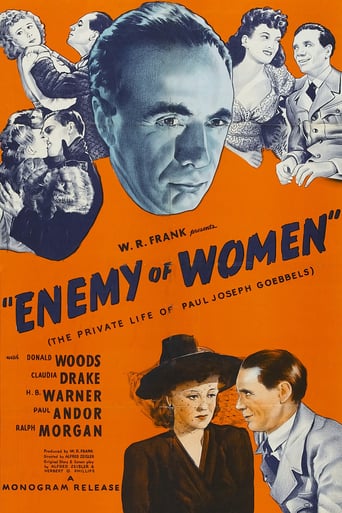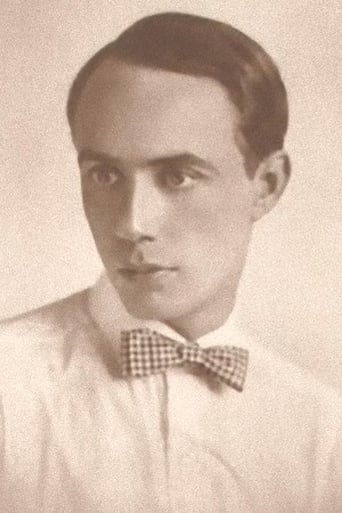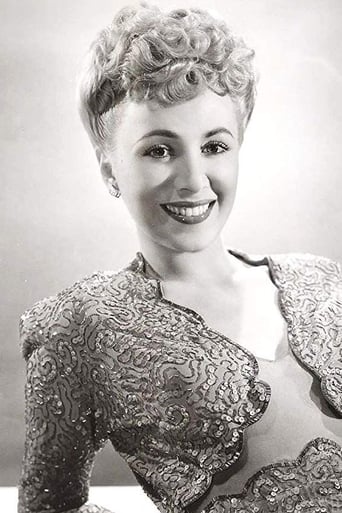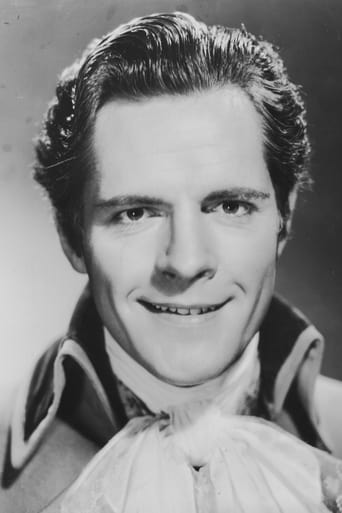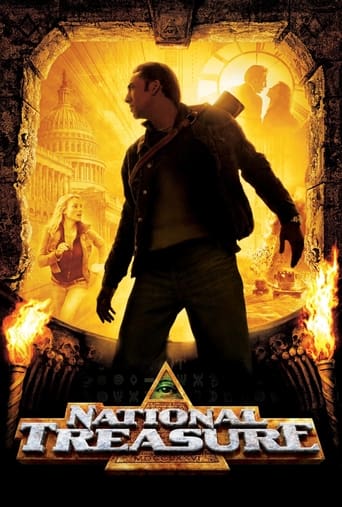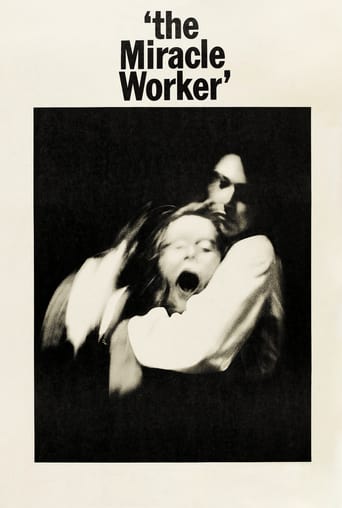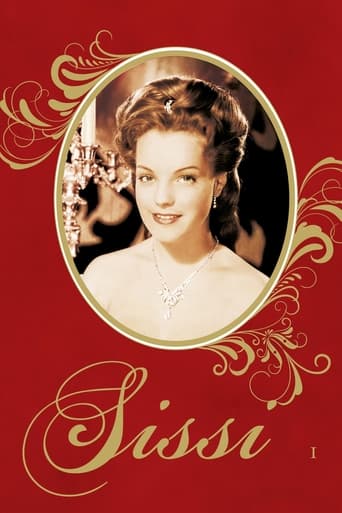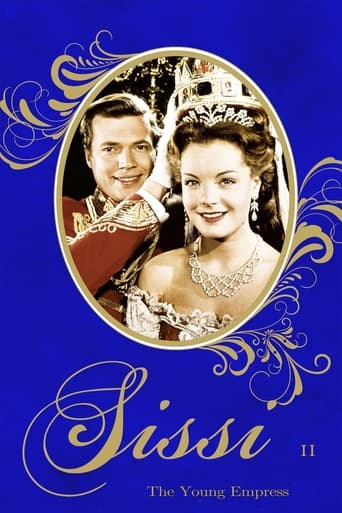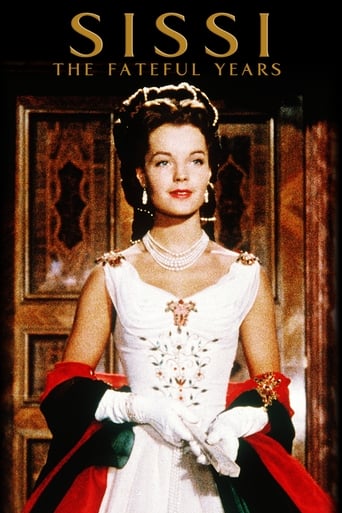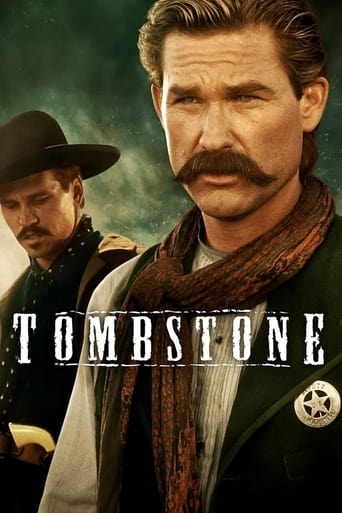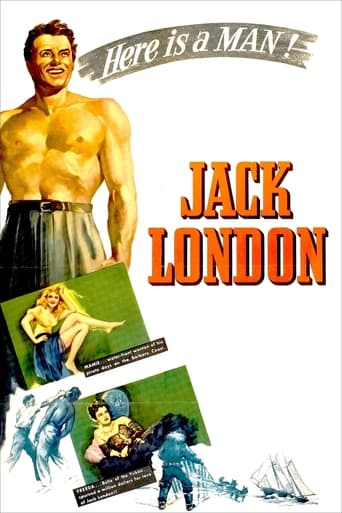Enemy of Women (1944)
Playwright Joseph Goebbels (Paul Andor) turns Nazi propagandist and loses his girlfriend (Claudia Drake) to another man (Donald Woods).
Watch Trailer
Free Trial Channels
Cast


Similar titles
Reviews
one of my absolute favorites!
It's a mild crowd pleaser for people who are exhausted by blockbusters.
Excellent characters with emotional depth. My wife, daughter and granddaughter all enjoyed it...and me, too! Very good movie! You won't be disappointed.
One of the most extraordinary films you will see this year. Take that as you want.
We are informed at the outset that "The following story unfolds the private life of the greatest scoundrel of our time". One would have thought that would have more aptly described Hitler himself, rather than Goebbels; but the Doctor would have been as flattered to be considered important enough to get an entire film to himself depicting him (as 'Inglorious Basterds' later put it) as "The number two man in Hitler's Third Reich", as he would have been disdainful of the result. At a time when far less was then known about him than has been documented since his death, as the most visible and vocal member of the Nazi hierarchy after Hitler it was widely assumed during their lifetime that Goebbels was the real brains behind the Führer. This was certainly how he was portrayed (superbly played by Henry Daniell) in Chaplin's 'The Great Dictator' (1940). Only after the war did it emerge that Goebbels had far less influence over Hitler than had generally been supposed. But that is the least of this film's many inaccuracies; and it shares with Stuart Heisler's 'Hitler' (1962) a similarly tedious fixation with it's subject's love life rather than his political activities.Originally titled 'The Private Life of Paul Joseph Goebbels', but at some point saddled with the absurd 'Enemy of Women', the film's writer-director Alfred Zeisler was one of Hollywood's many exiles from Nazi Germany and was thus in some instances drawing upon his own memories of the period when Goebbels was consolidating Nazi control over the German film industry; while at other times embellishing with the benefit of hindsight. The result is a bizarre but lamentably dull mishmash of surprisingly recherché historical information and total fabrication. On the one hand the film surprisingly includes the Austrian clairvoyant Erik Jan Hanussen (later portrayed by Klaus Maria Brandauer in István Szabó's 'Hanussen' in 1988) accurately predicting the Reichstag fire and the rise of Rommel; and Goebbels' secretary was indeed named Hanke, as he is called here. But the character of Maria Brandt, an Austrian actress with whom the Doctor becomes chronically obsessed - not to mention the time frame involved - bears no relation at all to the affair Goebbels actually had with the Czech actress Lída Baarová during the thirties. Stranger still, in 1931 Goebbels married Magda Quandt, by whom he had six children; but in this version of events Joseph seemingly remains a bachelor, and Magda, as played by Sigrid Gurie, appears simply as the mother of a boy young Joseph is teaching history, and has just one word of dialogue: "Harald!" The Führer himself is seen only fleetingly in longshot, Himmler is shown briefly from behind sounding like a Hollywood gangster; and that's all you see of the other Nazi leaders. Goebbels himself disappears from the film for long stretches, including much of the final third (Claudia Drake, who plays Maria Brandt, is ominously billed above supposed lead Paul Andor); and we are instead forced to watch Maria's extremely uninteresting romance with handsome and equally fictitious Dr. Hans Traeger. None of this is made any more involving by Zeisler's sluggish direction; and the end result is, alas, much duller than it sounds.
Actor Paul Andor (real name Wolfgang Zilzer) bears a striking resemblance to the real Dr. Paul Goebbels, the evil Nazi head of Propaganda who spent one day as Chancellor of Germany after Hitler's suicide before killing himself. This semi-fictional account of his life takes the basic known facts and changes the names and details, but it still has a major impact on the emotional structure of this Monogram film that is two notches above most of their "B" films, giving it almost an "A" look. Claudia Drake is top billed as Maria Brandt, an actress loosely based upon the real life actress Lída Baarová who was Goebbel's real life mistress. This film does not mention the fact that he had a wife and six children (murdered by him and his wife right before they killed themselves) and does not go into great detail about most of his evils which were probably discovered after the war ended. But being made while Goebbels was still alive, this was definitely a curiosity piece in the Hollywood propaganda machine, just as effective as "The Hitler Gang" (the story of Hitler's rise to power with a warning of how he would ultimately fall) and "None Shall Escape" which cast Alexander Knox as a Nazi officer on trial AFTER the war even though it was made the same year. One of the most chilling sequences comes when a medium forecasts the futures of Goebbel and several other Nazi's in the room (including General Rommel) but only includes their triumphs, not the ultimate fall from power and retribution. Andor is off screen for much of the film as the story of actress Drake and her romance with a good German doctor (Donald Woods) takes over. It then moves to his blackmail over Drake in threatening Woods' safety after they return to Germany, having settled in Vienna. Told in flashback, the storyline has Goebbels remembering his first encounter with Hitler and how he first met Brandt as a struggling playwright working as a tutor. Even then, he was teaching values which were adopted by the Nazi's. When he makes a violent pass at Brandt, her World War I veteran father (an excellent H.B. Warner) throws him out which leads to later revenge on him and reveals his obsession with her. While he is definitely presented as monstrous, Goebbels is also given shadows of sympathetic characteristics, being quite in tuned to the arts which makes his being chosen head of propaganda (which would include movies, theater and radio) a smart move on Hitler's part even though it is obvious through history that their choice of subject matter for the U.F.O. (the major German film company) was one sided. Supporting performances by Sigrid Gurie, Ralph Morgan, Gloria Stuart and Robert Barrat add great period detail. There's a funny sequence in a Vienna café where impersonators of Hitler, Goebbels and Mussolini do a musical number. The tension of the film rises to its high point in the finale where the defeated Drake makes a drastic decision and must distract her husband in order to save his life. The final shot of Andor searching amongst the rubble of an air raid and his radio narration of the events which have recently taken place give forbearance to the creed that fascist leaders manipulate their followers through lies whether it be done blatantly or with total charm, but indeed, they are lies, and liars are always exposed.
Of all the gang around Adolf Hitler probably the sickest and most degenerate was Joseph Paul Goebbels. Minister for propaganda and public enlightenment, he was one of the few who was not trying to cut a deal for himself when the Third Reich was in its last days. He stayed loyal to the master to the bitter end.If Dr. Freud could have gotten Dr. Goebbels on the couch I'm sure his notes would have been fascinating. Like Somerset Maugham's protagonist Philip Carey in Of Human Bondage, Goebbels was born with a club foot and that together with a raging libido was the story of his life. When he was a nobody he couldn't get a date, when he became minister his job included supervision of the German film industry. He had a casting couch that put L.B. Mayer's and Darryl Zanuck's to shame.This film concerns his obsession with one he couldn't get. Claudia Drake who laughingly rejects him while he was trying to earn a living as a tutor pays for it the rest of the movie. She and father H.B. Warner and husband Donald Woods. Goebbels never forgot a slight in real life.Wolfgang Zilzer plays Goebbels and it's a change from Martin Kosleck who usually played Goebbels when he was a character in film. If you want to see a good portrayal of Goebbels in a good film I highly recommend The Bunker where Cliff Gorman and Piper Laurie played Joe and Magda Goebbels. She's a cipher here and that's wrong in and of itself. She was as sick as he was, maybe worse. But she completely put up with his womanizing because she didn't believe in letting the grass grow under her feet. There's a fine account of that in Albert Speer's memoirs.Making Magda a peripheral character in the story is a big mistake. And the general shoddiness of production doesn't help either. In fact at the end of the film the narrator says this story isn't finished and how could it be in 1944. Still this World War II propaganda has some good moments in it and should be seen as a curiosity.
Considering its lowly Gower Gulch origins, and compared with the overblown hysterics and buffoonish characterizations of most Hollywood propaganda films, this is a remarkably heartfelt and even-handed treatment of lurid and melodramatic material. Goebbels is delineated as a tragically flawed human being rather than a cartoonish ogre, and his final scene amidst the rubble is strangely ambivalent. Much credit must go to director Zeisler (best known for his minimal-budget adaptation of "Crime and Punishment", entitled "Fear") who has taken measures to add a psychological and emotional background to the principals, despite the cardboard situations and some risible theatrical devices (particularly Goebbels' incidental invention of the "Heil Hitler" salute). Equally praiseworthy is the noirish cinematography of the incomparable John Alton, whose precise lighting of eyes, faces and profiles adds so much depth to the characterizations.

